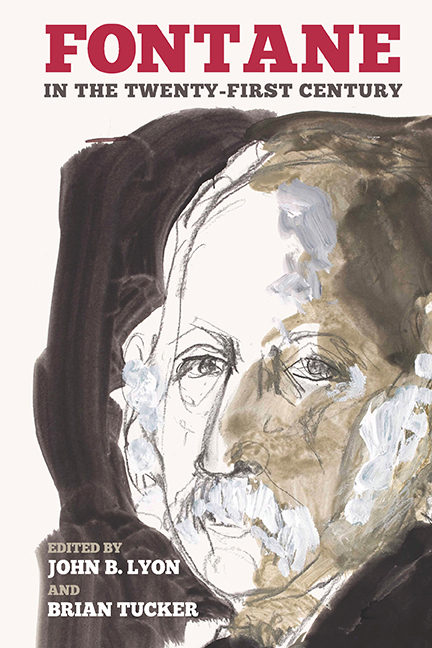Book contents
- Frontmatter
- Contents
- Acknowledgments
- Note on Editions
- Introduction: Fontane in the Twenty–First Century
- 1 Narrative Digression and the Transformation of Nationhood in Vor dem Sturm
- 2 Nasty Women: Female Anger as Moral Judgment in Grete Minde and Effi Briest
- 3 Performing the Philistine: Gossip as a Narrative Device and a Strategy for Reflection on Anti-Semitism in Theodor Fontane's L'Adultera
- 4 To Have an Eye: Visual Culture and the Misapprehension of Class in Irrungen, Wirrungen
- 5 Fontane as a Pacifist? The Antiwar Message in Quitt (1890) and Fontane's Changing Attitude to Militarism
- 6 Disjunctive Transnationalisms in Fontane's Frau Jenny Treibel
- 7 On the “Right Measure” in Effi Briest: Ethics and Aesthetics of the Prosaic
- 8 Transfiguration, Effect, and Engagement: Theodor Fontane's Aesthetic Thought
- 9 Fontane and World Literature: Prussians, Jews, and the Specter of Africa in Die Poggenpuhls
- 10 Von Zwanzig bis Dreißig: The Male Author in Parts
- 11 Melusine von Barby's Barriers and Connections in Fontane's Der Stechlin
- 12 Senescence and Fontane's Der Stechlin
- Notes on the Contributors
- Index
12 - Senescence and Fontane's Der Stechlin
Published online by Cambridge University Press: 31 August 2019
- Frontmatter
- Contents
- Acknowledgments
- Note on Editions
- Introduction: Fontane in the Twenty–First Century
- 1 Narrative Digression and the Transformation of Nationhood in Vor dem Sturm
- 2 Nasty Women: Female Anger as Moral Judgment in Grete Minde and Effi Briest
- 3 Performing the Philistine: Gossip as a Narrative Device and a Strategy for Reflection on Anti-Semitism in Theodor Fontane's L'Adultera
- 4 To Have an Eye: Visual Culture and the Misapprehension of Class in Irrungen, Wirrungen
- 5 Fontane as a Pacifist? The Antiwar Message in Quitt (1890) and Fontane's Changing Attitude to Militarism
- 6 Disjunctive Transnationalisms in Fontane's Frau Jenny Treibel
- 7 On the “Right Measure” in Effi Briest: Ethics and Aesthetics of the Prosaic
- 8 Transfiguration, Effect, and Engagement: Theodor Fontane's Aesthetic Thought
- 9 Fontane and World Literature: Prussians, Jews, and the Specter of Africa in Die Poggenpuhls
- 10 Von Zwanzig bis Dreißig: The Male Author in Parts
- 11 Melusine von Barby's Barriers and Connections in Fontane's Der Stechlin
- 12 Senescence and Fontane's Der Stechlin
- Notes on the Contributors
- Index
Summary
IN THE DRAFT of a letter to Adolf Hoffmann from May/June 1897, Theodor Fontane describes Der Stechlin (1898) as a novel with a slim plot:
Zum Schluß stirbt ein Alter, und zwei Junge heiraten sich;—das ist so ziemlich alles, was auf 500 Seiten geschieht…. Alles Plauderei, Dialog, in dem sich die Charaktere geben, und mit ihnen die Geschichte.” (17:49)
[An old man dies at the end and two young people marry. That's pretty much all that happens on 500 pages…. All chatter, dialogue, in which the characters reveal themselves and through them the story.]
Scholarship on Der Stechlin has frequently returned to this letter as a starting point for analyses centering on Fontane's extensive dialogue scenarios. It focused particularly on Fontane's own assessment of the exchanges, which, according to the same letter, the author sees as a quintessential part of the mode of the Zeitroman. That is, the parochial locale of East Brandenburg sustains cosmopolitan ties during formal and informal conversations among characters and offers readers insight into the political and social realities of the time during which the novel was written. To this end, exchanges in the novel frequently unveil the waning influence of the aristocracy against the backdrop of bourgeoning social and political transformations throughout the German Empire. This is most visible in the loss of a local election for the title character, Dubslav Stechlin, who ran as the Conservative candidate in the region. The office instead goes to a cosmopolitan Social Democrat for the first time.
Although certainly a thorn in Dubslav's side, the shifting political and social climate in the region responsible for his loss in the election only temporarily weighs on his mind. In fact, while he appears excited about the election initially, he soon expresses little interest in the office and signals relief to have lost the election in the end. Still, Dubslav regularly airs concern about a changing world: nearly every conversation in the novel thematically relates tensions about the “old” and the “new.” Remarkably, each complaint is followed by his decision not to care too much about the matter. His old age appears to temper his anxieties about the present in some moments.
- Type
- Chapter
- Information
- Fontane in the Twenty-First Century , pp. 232 - 246Publisher: Boydell & BrewerPrint publication year: 2019



